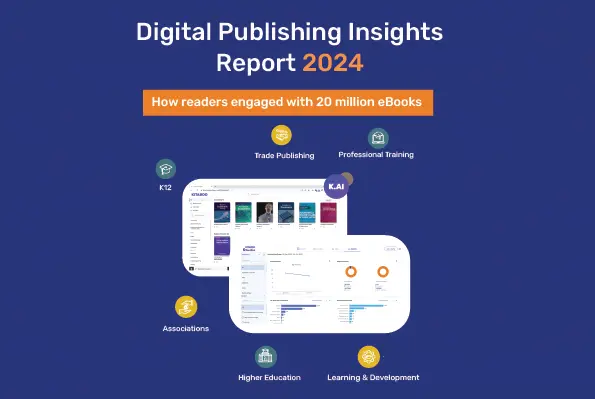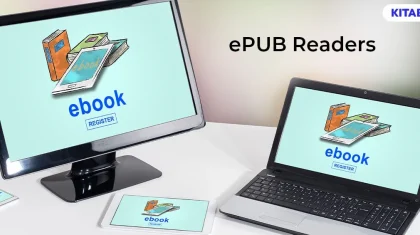
Unlock the Soundtrack: eBook to Audiobook
Audiobooks help stories connect with a diverse audience, such as commuters and individuals with visual impairments. Audiobooks use spoken language to transport listeners into a world of emotions and stimulate their senses. This medium enhances storytelling and deepens the bond between the audience and the narrative.
When you convert eBooks to audiobooks, it helps you open up a new realm of accessibility and engagement, expanding your reach and enriching the overall experience for your audience.
Table of Contents:
II. Benefits of Converting an eBook into an Audiobook
III. Creating Your First Audiobook: Step-by-Step Process
IV. The Final Step: Distribution
V. Wrapping Up
Audiobooks: A Brief
Audiobooks consist of recordings where people read books aloud. Many apps make it easy to listen to audiobooks and offer extra features like bookmarking or note-taking.
Audiobooks are generally intended to be enjoyed separately from the printed book. Different reading applications on eReaders can further enhance the reading experience. For example, the Immersion Reading feature on the Kindle App synchronizes an ebook with its corresponding audiobook, allowing readers to follow along while reading.
Benefits of Converting an eBook into an Audiobook
In 2023, the worldwide audiobook market reached a value of USD 6,487.72 million and is projected to experience a CAGR of 26.3% throughout the forecast period. This transition from eBooks to audiobooks represents a substantial shift in how people engage with literature.
This transformation is not temporary but rather a permanent alteration in reading preferences. Now, let’s explore the benefits of this transition:
1. Greater Accessibility
Audiobooks can help improve the quality of life for individuals with visual impairments, dyslexia, or challenges with reading.
By converting eBooks into audio format, businesses and publishers can reach a wider audience. This ensures accessibility for everyone, especially those living in remote areas.
2. Seamless Multitasking
Today’s fast-paced society has made multitasking an essential tool. Audiobooks allow people to enjoy their favorite literature on the go—while they are at the gym, on a train or bus, or doing other household chores. More importantly, multitasking saves time and makes simple, everyday assignments more efficient.
3. Time-Efficient Consumption
Audiobooks offer a convenient way to consume books more quickly than traditional reading, enabling listeners to choose their desired narration speed. This time-efficient characteristic is particularly appealing to individuals with busy schedules, including professionals with demanding workloads and students managing multiple commitments.
4. Convenience and Portability
Audiobooks are ideal for people whose schedules are always busy or who are frequently moving from one place to another.
No matter where you normally find yourself—during transit, completing chores, or going out for an early morning run—nothing will distract from your reading experience. This is why people who are constantly on the move prefer listening to audiobooks.
According to a survey, 32% of people read 2 or 3 books per month, while 29% read 4 to 7 books. This means that 61% of audiobook fans are devoted readers. These findings show a growing interest in audio content, making a strong case for delving into this captivating world.
Creating Your First Audiobook: Step-by-Step Process
There are several eBook-to-audiobook converters on the market that can help you bypass the hassle of working on the conversion process manually.
Here’s how you can use eBook-to-audiobook converters to enhance your audiobook creation process:
1. Set Up Your Recording Space
Transforming your eBooks into audiobooks is possible from the comfort of your own home.
Follow the steps below to set up your recording space:
- Create a recording area: Any quiet room with good acoustics will work. Consider using soft furnishings like curtains and carpeting to reduce echo. Even a messy bedroom with clothes can work surprisingly well, as some voiceover artists have discovered, even recording in their closets.
- Gather necessary equipment: Invest in noise-canceling microphones, acoustic panels, and headphones for optimal sound quality. These can be purchased or even DIYed.
- Choose recording software: Explore options like Audacity or WavePad Editor for recording and editing your audio. These user-friendly audio eBook tools provide essential features for producing professional-quality audiobooks.
2. Hire a Voiceover Artist
Short on time or lacking the necessary skills? You always have the option to outsource the job. There are various online platforms where you can discover talented voiceover professionals who can help narrate your book.
ACX, a subsidiary of Amazon, is dedicated to audiobooks. The Voice Realm is designed for voiceover professionals in general. Major freelance platforms such as Fiverr, Upwork, and Freelancer also offer lists of voiceover freelancers.
Before deciding:
- Request auditions from multiple artists using a book sample.
- Choose the artist you prefer.
- If you’re investing in the project, make sure it meets your satisfaction.
- Outsource To Professional Publishers
3. Outsource To Professional Publishers
If you do not wish to complete the conversion process yourself or hire a freelancer, you can conveniently outsource the entire publishing process to any of the reputable eBook to Audiobook Converters designed specifically for audiobooks.
Amazon’s Audiobook Creation Exchange (ACX) stands out as a popular audiobook platform, distributing to iTunes, Audible and Amazon. Such platforms make it easy to find a narrator and producer for your audiobooks as well as distribute them.
However, for a more tailored and comprehensive publishing experience, consider exploring alternatives like KITABOO to Convert eBooks to audiobooks. With KITABOO’s suite of publishing solutions and innovative features such as text-to-speech conversion, you can access not only audiobook production but also a range of interactive features and distribution channels tailored to your unique requirements.
The Final Step: Distribution
With audiobook listenership crossing over 50% of the U.S. adult population in 2023, the final step is to distribute and sell your audiobooks to a wide audience.
Similar to eBooks, there are several avenues through which you can make your audiobook accessible to the public.
Here’s how:
1. Blog or Website
Your website or blog serves as a central location for sharing your audiobook with your audience. Consider offering it as a downloadable perk for subscribers to increase engagement and loyalty. Additionally, use your platform to showcase sample chapters or excerpts to attract potential listeners and drive sales.
2. Audiobook Marketplaces
Utilize platforms like Audible, iTunes, Google Play Books, and Kobo to expand your reach to a wider market.
These services feature a broad range of audiences and established sales platforms where your audiobook will have many listeners. By placing your audiobook on these platforms, you can get more listeners and increase the exposure of the book in the audiobook market.
3. Distributors and Aggregators
Distributors and aggregators connect you to different audiobook retailers to help you sell your books. And as with ebooks, there are a few that will help make that happen for you.
Aggregators like Findaway Voices, ACX, Listen Up Audiobooks, Audio Shelf, and Author’s Public streamline audiobook distribution to multiple retailers, simplifying the process for authors. These platforms not only facilitate publishing but also ensure widespread availability across diverse channels, maximizing your book’s reach and potential sales.
Wrapping Up
Audiobooks offer a more engaging experience that goes beyond traditional reading. They serve diverse audiences and enrich people’s lives through immersive storytelling.
Transitioning from eBooks to audiobooks offers readers an opportunity to access resources without compromising on multitasking. Moreover, it provides convenience for people who are constantly on the move.
Whether produced independently or by established publishers, audiobooks offer many possibilities for connecting with your target audience.
Discover the realm of audiobooks with KITABOO, a premier digital textbook platform equipped with an innovative eBook to audiobook converter. With the help of this converter, you can seamlessly enhance your content by transforming eBooks into captivating audiobooks.
Connect with us now!
Discover how a mobile-first training platform can help your organization.
Kitaboo is a cloud-based platform to create, deliver & track mobile-first interactive training content.





